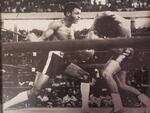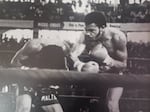Many boxing fans are eagerly awaiting Saturday’s fight between defending heavyweight champion Tyson Fury and Deontay Wilder, but Portland had its own brush with bigtime boxing.
Back in the 1970s, Portland’s “Lightning Ray” Lampkin was boxing elite, fighting against then-WBA lightweight champion Roberto Durán and other top names in the sport.
OPB’s Paul Marshall sat down with Lampkin recently to talk about his career and how he started boxing as a boy. You can also listen to their conversation using the audio player at the top of this story.
Paul Marshall: How did you get into boxing?
Ray Lampkin: When I was a kid, I would walk around and see these posters of these fighters. I wanted to do that. I had a lot of fights in schools. It was something that I wanted to do. I wanted to be famous. I wanted to have my picture on the wall also.
Marshall: What age did you start fighting?
Lampkin: About 9. I found out there was a community center in the neighborhood that taught boxing. They had a boxing class for amateurs. I walked in there one day and tried to find the gym and who to talk to. I told them that I wanted to learn how to box and that’s how it got started.
Marshall: What do you remember about the early days?
Lampkin: I fought as an amateur. I lost the first amateur fight that I had. In 1958, they had the Montavilla Community Tournament, a novice tournament for people with less than 5 fights. I won my first fight at the age of 10 weighing 45 pounds. It felt good, and I got a little gold belt buckle afterwards. As I got older, I ended up getting the golden gloves tournament: won five golden gloves tournaments and was a runner up in three other tournaments.
Marshall: What was Portland’s boxing scene like?
Lampkin: Portland used to have used to have so many boxers, a lot of young kids fighting. In the Golden Gloves tournament, we would fight teams from Seattle, Tacoma. It was a big show that lasted three days. Back then, you win Golden Gloves, then you go to national tournaments, and then from nationals you would qualify to be in the Olympics. I’m not sure what changed it, but gyms used to be full at one point.

Lampkin takes a big swing.
Courtesy of Ray Lampkin
Marshall: How’d you get the nickname “Lightning Ray”?
Lampkin: I got it when I turned pro. My manager thought my jab was lightning fast. Every fighter that was a pretty good fighter wanted to be called “Sugar Ray” after Sugar Ray Robinson. My manager had settled on Lightning Ray, and that was that.
Marshall: When did you know it was time to turn pro?
Lampkin: I was getting older and the time came. I had 10 pro fights without a manager or trainer. I had nine wins and one draw. I didn’t want to waste anymore time. If I was going to do anything, then I need to get with someone with some connections. I ended up getting with Mike Morton, who was one of the main managers here in Portland. Mike had connections and I ended up signing with him.
I lost my first pro fight in San Juan, Puerto Rico. I fought Esteban de Jesús. Roberto Durán was the champ of the world. Esteban beat Durán . I wanted to see what I would do against the best. When I got over there, I just knew that I was going to beat him. He knocked me down in the first round. It was more embarrassing than hurt. We went 12 rounds. He had home field and got the decision. I lost to the best fighter in the world.
Marshall: What was your early boxing schedule like?
Lampkin: I worked full time. When I turned pro, I was working at Pacific Meatpacking Company at the slaughterhouse where we killed sheep, cows, calves and hogs. I worked there for my whole career. The foreman allowed me to go and fight as long as I was winning. But if I was losing he would give me a choice: either box or work.
There was another guy who was working there that also boxed but he was losing. Either stay here and work or leave and box. It was my only way of income so I had to win.

Lampkin throws a power punch.
Courtesy of Ray Lampkin
Marshall: How did boxing help you?
Lampkin: I learned a lot from it, and it really did change me. I might have been in jail somewhere if I was running around with guys who would end up in prison. I don’t know what I would have done if I was not working and boxing.
Marshall: Do you remember what it was like coming home after your big fights?
Lampkin: I fought the two best fighters in the world at that time, (Roberto) Durán and Esteban (de Jesús). I wanted to see how good I was. In both cases, on equal grounds, I could beat them. When I came, Gov. Neil Goldschmidt and the whole butcher’s union were there to greet me along with my family and friends. One of the papers asked if the president was coming in town, and they said “No, it’s Lightning Ray Lampkin.”
